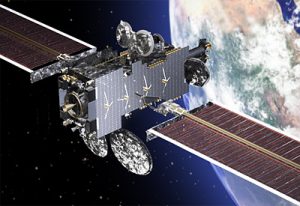
Lockheed Martin, Arab Satellite Communications Organization (Arabsat), and King Abdulaziz City for Science and Technology (KACST) in Saudi Arabia have successfully completed a comprehensive technical review of ARABSAT-6A and Hellas-Sat-4/SaudiGeoSat-1, two satellites that will provide television, internet, telephone and secure communications, to customers in the Middle East, Africa and Europe.
To achieve this milestone, Lockheed Martin completed the Critical Design Review of the satellite and each subsystem, demonstrating the satellite design meets technical specifications and is ready for the next phase of production. With Critical Design Review complete and manufacturing underway, the Lockheed Martin team will now move further into the production process.
“Now that we’ve completed this intensive design review, we’re moving forward into the build, integration and test phase for ARABSAT-6A and Hellas-Sat-4/SaudiGeoSat-1,” said Carl Marchetto, Lockheed Martin’s vice president and general manager of Commercial Space. “We’re already producing important components for the satellites including antenna reflectors, panels and the core structure, and are excited to continue manufacturing these important satellites.”
ARABSAT-6A will be located at 30.5 degrees East and Hellas-Sat-4/SaudiGeoSat-1 will be located at 39 degrees East. Both satellites will be designed for a 15-year service life, and will be manufactured in Denver, Colorado, in the United States. There are five modernized A2100 satellites currently under contract to Lockheed Martin and they are designed for a host of missions and customers around the globe.
Lockheed Martin is also partnering with Taqnia Space and KACST to provide training in satellite engineering and manufacturing to Saudi Arabian students. The contract for ARABSAT-6A and Hellas-Sat-4/SaudiGeoSat-1 was awarded to Lockheed Martin in April 2015, and is estimated to be worth around US$650-million.
Hellas-Sat-1/SaudiGeoSat-1 will be launched by Arianespace from the Kourou launch facility in French Guiana in 2018, while ARABSAT-6A shall be launched by SpaceX, also in 2018, from a yet-to-be-determined launch facility in the United States.
 SpaceWatch.Global An independent perspective on space
SpaceWatch.Global An independent perspective on space

